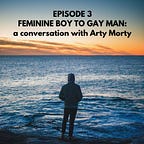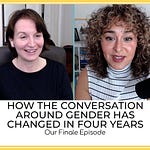Quick Notes:
Arty Morty* found it very difficult to grow up as a feminine boy amongst his peers. In this episode he explains how difficulties in his social and family life shaped his identity development. Ultimately, he came to accept himself as a gay man and he touches upon the new concept of gender identity and how it might have impacted his identity had he been a teen today.
*Arty Morty is a pseudonym
Links:
Rupert Everett on Childhood Dysphoria
The Man Who Would Be Queen by Michael Bailey
Extended Notes
Who is Arty and how has gender touched his life?
Arty has always been a feminine boy growing up. He grew up with his mother and his sister.
Arty remembers one of his very first memories (at the age of 2) was him wanting to be one of Charlie's Angels.
Arty’s father was in the army and he died. This made his mother very opposed to weapons and violence.
When Arty went to school, his feminine nature became a huge problem. The children thought he had AIDS.
When Arty’s family moved to a smaller town, the bullying got much worse. Not only was he a sissy boy, but he was a city nerd.
Male figures frighten Arty. They were too rough and always wanted to fight. Arty had a lot more fun by having female friendships.
Arty would have a fun time playing one-on-one with boys, but the moment another one showed up, they had to reject him and take on a more masculine role.
Were there any other boys in Arty’s group that are now gay?
Because Canada is such a hockey country, which is very violent in itself, a lot of the men Arty grew up with thought this behavior was normal.
It’s the Canadian identity to watch people beat each other up.
Arty was getting teased, bullied, and beat up regularly at school. He had enough. He ran away from home at 15.
You see in the media how men act a certain way. Arty knew he would never be one of those guys. He knew that the world had no place for him.
No matter how much gay acceptance there is in the world, it will always be hard for a teenage boy trying to find his way.
People say being gay is an identity. It’s not. It’s a physiological reaction.
There still isn’t proper representation in the media. Yes, there might be gay characters, but they’re a trope and not a real representation of gay people.
Are gay men attracted to masculine traits?
Some gay men have a total rejection of gay culture. Arty explains a little bit about the gay ghettos you’d find in cities back in the ’90s.
There’s a lot of ambivalence when you discover there’s something different about you.
When did Arty come to terms with his sexuality?
If Arty was 15 today, how would he feel about coming out today?
In today’s climate, Arty would identify as trans if he could at that age. He would have wanted to undergo a sex change, but he’s glad he has the body he has today.
Not all feminine boys become attracted to the same sex.
Although being gay has been decriminalized, it still feels like we’re living in the early days.
How should parents react or best approach their child’s gender nonconformity?
Finding yourself is hard. It’s part of being human.
This podcast is partially sponsored by ReIME, Rethink Identity Medicine Ethics:
Learn more about our show: Linktr.ee/WiderLensPod











